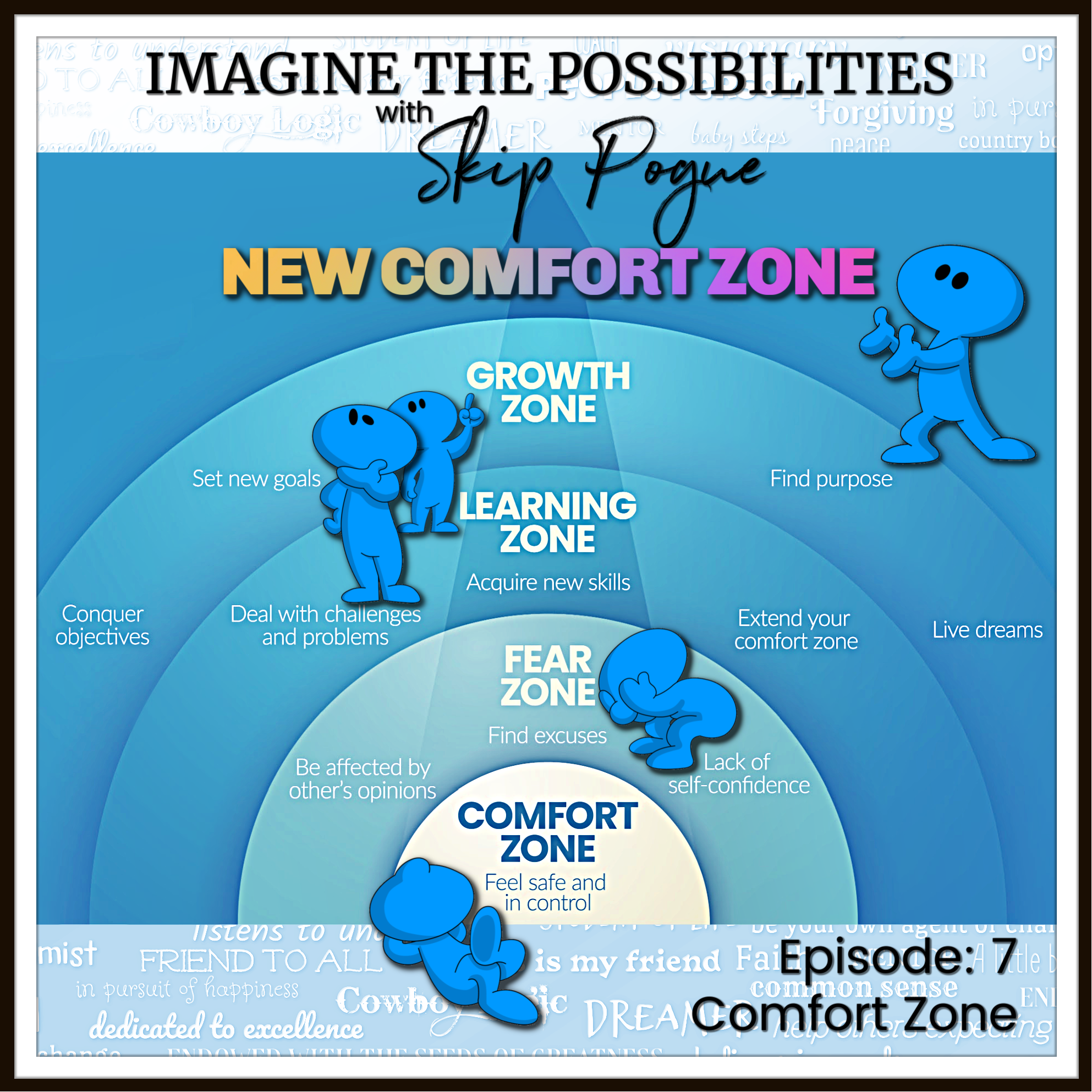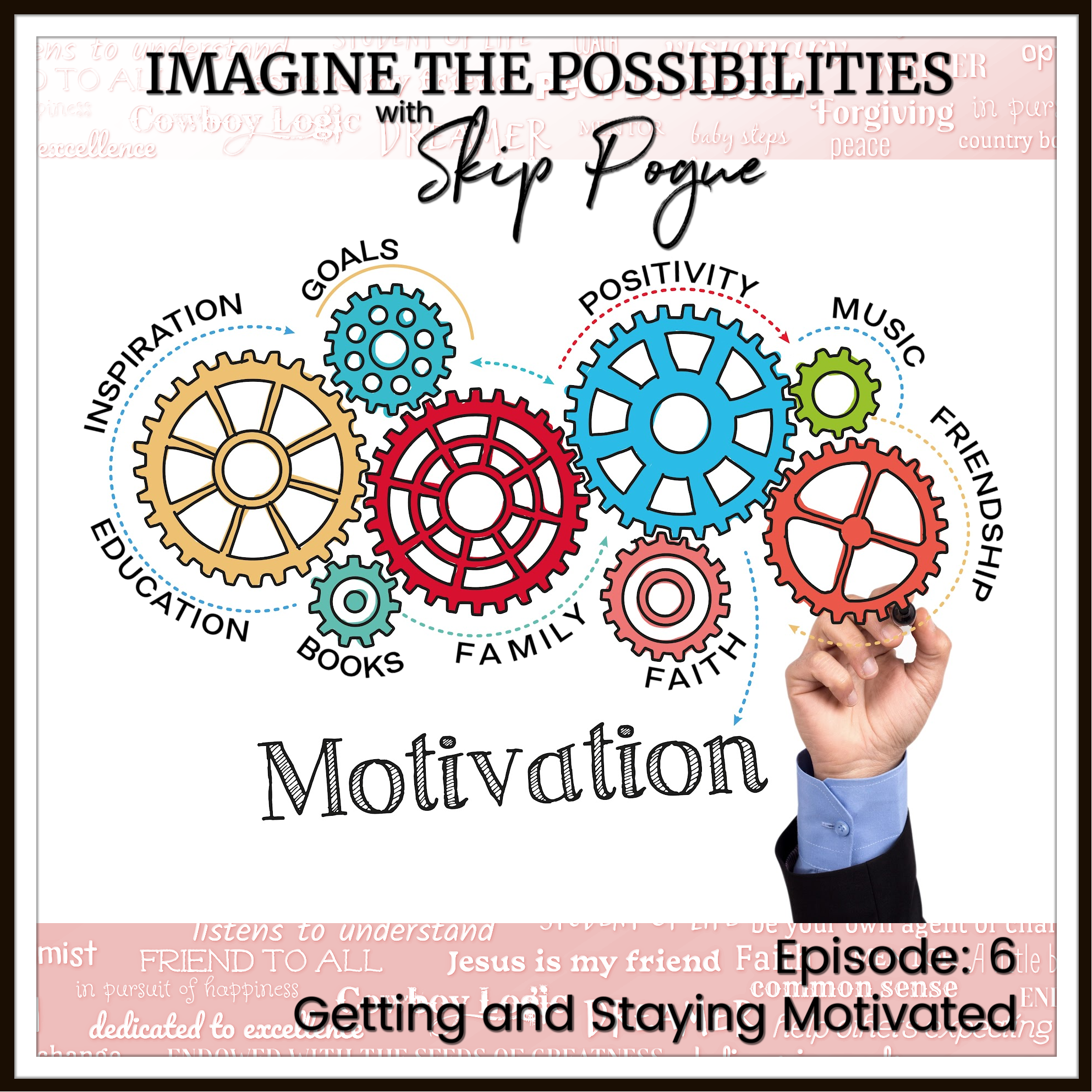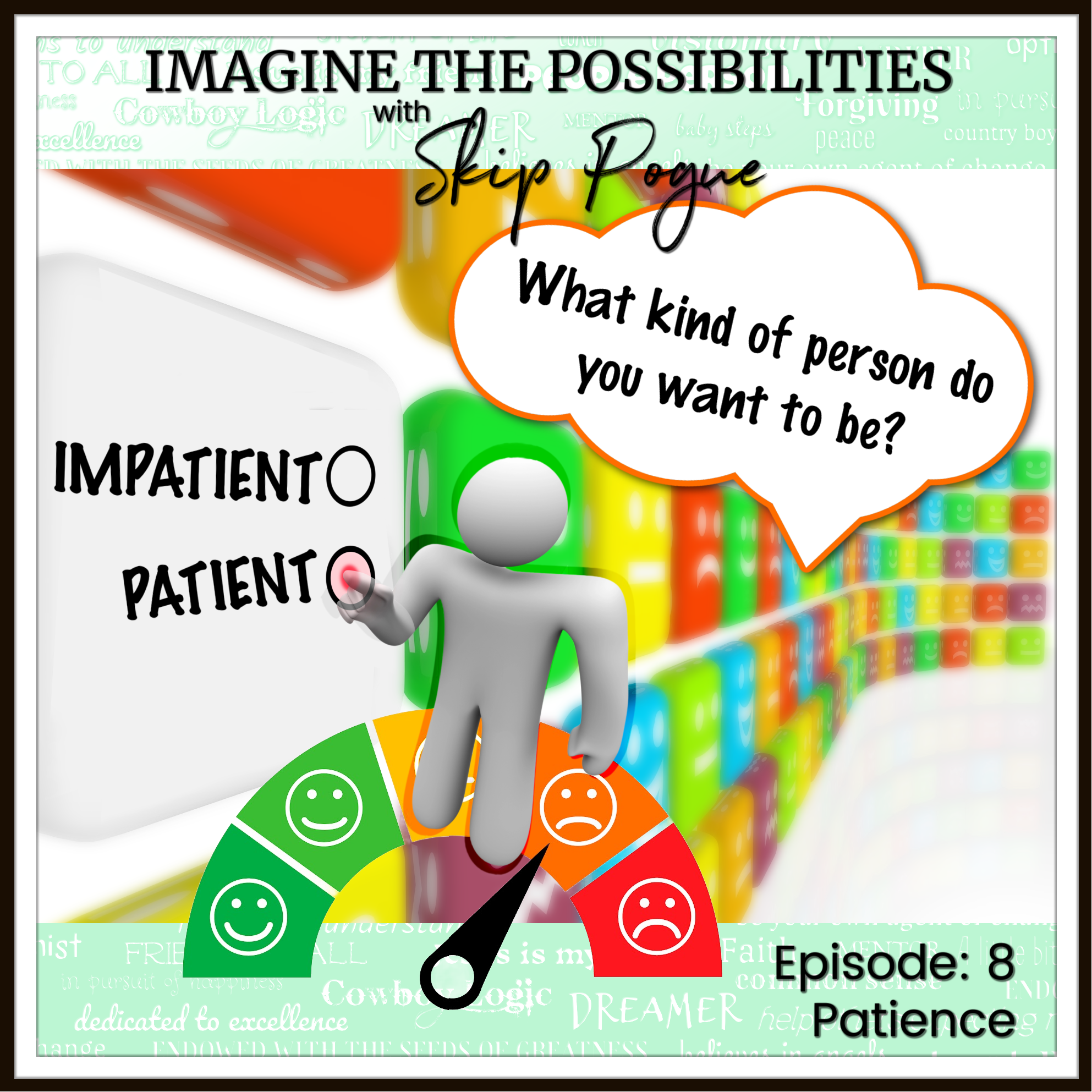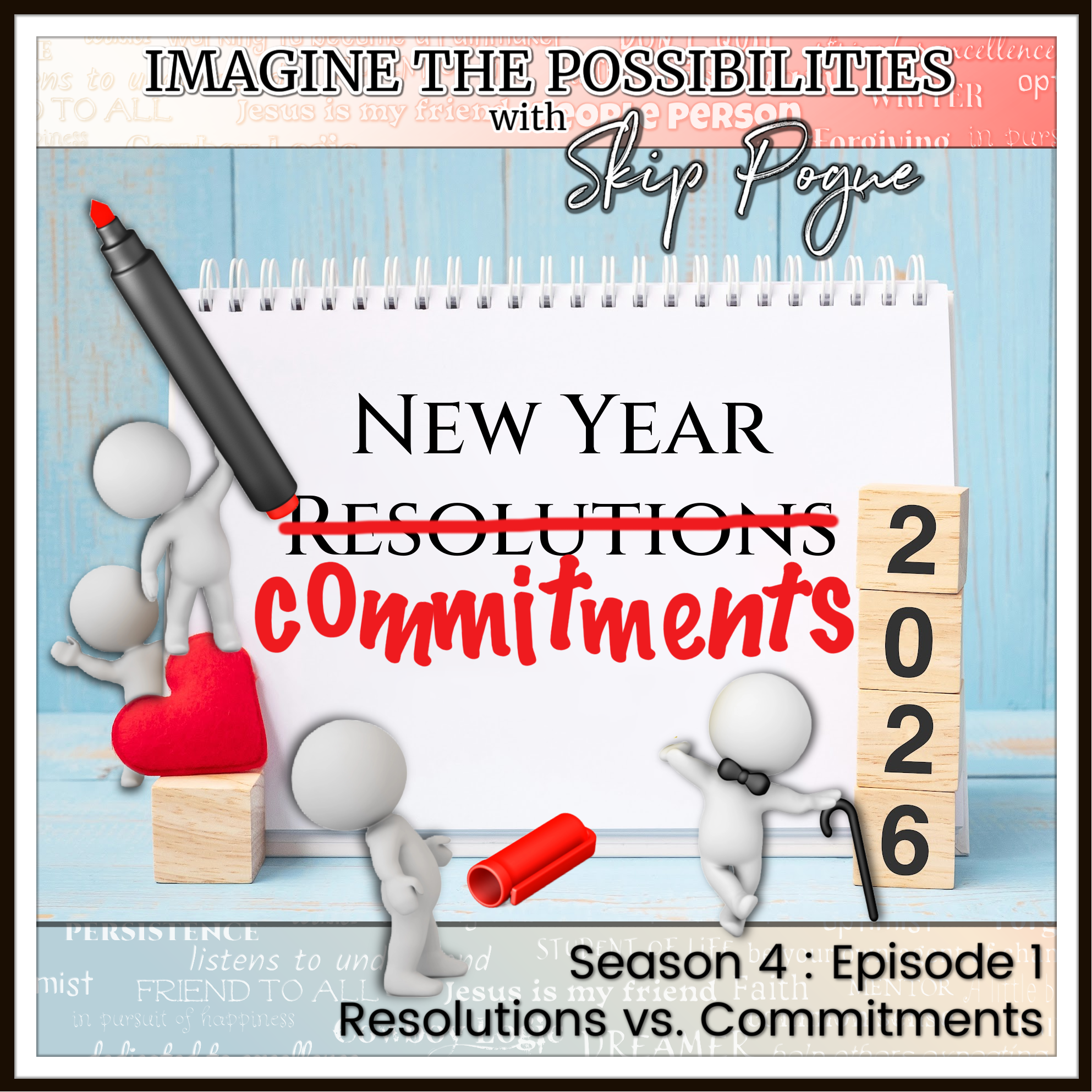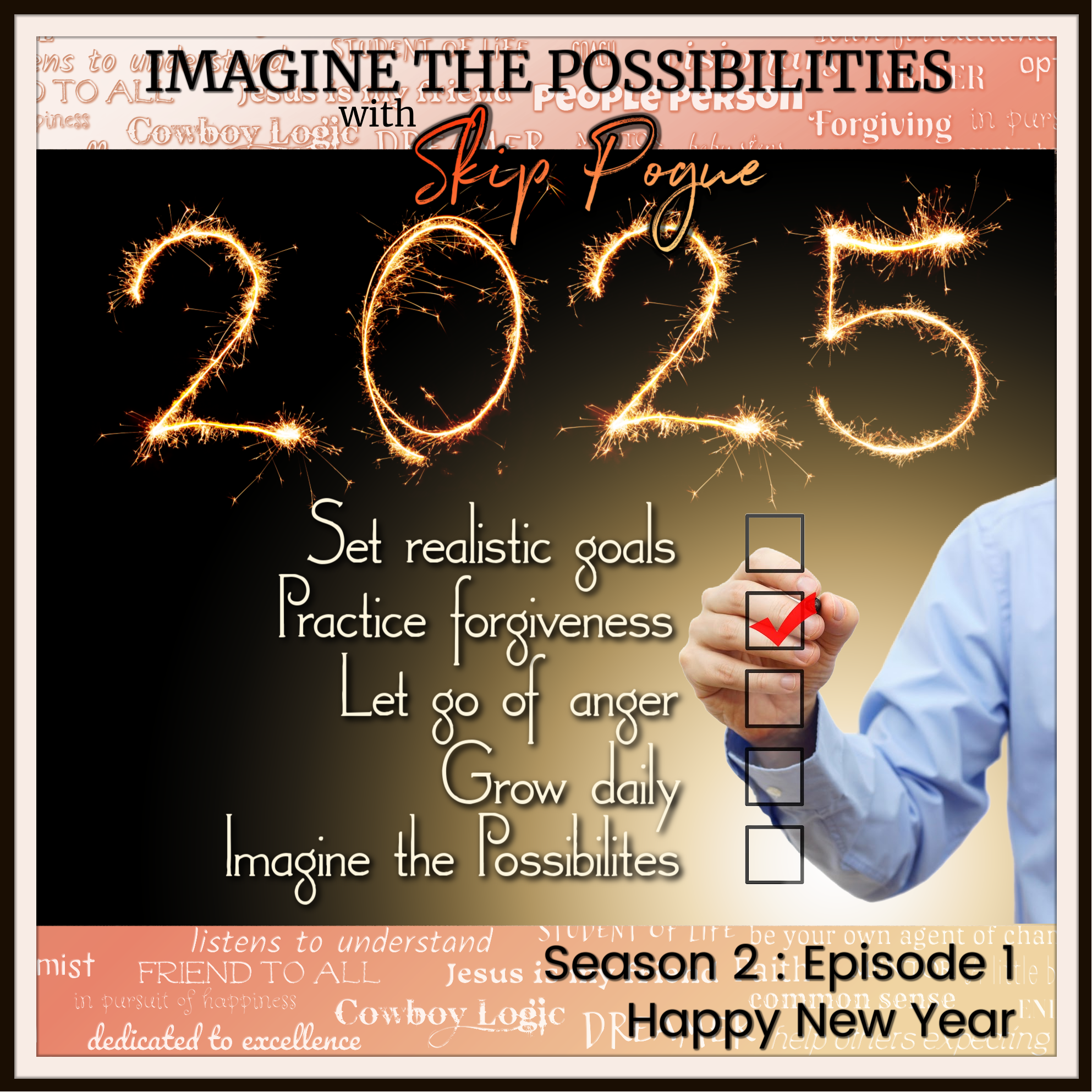In today’s episode, Comfort Zone, I’ll take us on a deeply personal journey of stepping out of one’s comfort zone—starting with my 2007 prostate cancer diagnosis. Through courage, perseverance, and faith, I’ll share how I faced the unknown and set life-changing goals along the way. From medical challenges to public speaking and personal growth, I hope to give you a powerful reminder that expanding our comfort zone is key to overcoming fear. Join me as we explore how to grow, adapt, and embrace the possibilities beyond our comfort zones.
View Full Transcript
Episode Transcript
[00:00:01] Hello, and welcome to imagine the possibilities.
[00:00:13] My name is Skip Pogue, and as you can tell, I've got a new toy to play with.
[00:00:18] I want to talk about our comfort zone, and I'm going to give you an example of somebody getting taken completely out of their comfort zone. That somebody happens to be me.
[00:00:29] In September of 2007, I was diagnosed with prostate cancer.
[00:00:36] My doctor and I talked through it and everything and asked him, I said, what's next? I said, what do we need to do? I need to do something. And he said, well, I'd like to do surgery. And I said, that's fine. When? And so they scheduled surgery in November of 2007. He did the surgery using a da Vinci robot. And I came through the surgery fine. I was in recovery the next time I saw him and knew who he was. And he told me, he said everything went fine. He said, took about the time we knew it would take. Everything's fine, you know, glued you back together and everything. And he said, but. And as soon as he said, but I knew everything wasn't fine. So he told me, he said, the problem is that the margins tested positive for cancer. And I said, I'm not sure what that means. And he said, it means we didn't get all the cancer. And I said, well, what do we do now?
[00:01:39] And he said, well, let's get you healed up and everything, and then we'll talk about it. And I was like, okay. So I went home, rested a couple weeks, got healed up and everything feeling better. Went back to the doctor for checkup, and he said, we're just going to monitor your psa and see where it goes. He said that it could go down or it could stay where it's at, or it could go up. Well, his luck would have it. Mine went up. June of 2008, I started a regimen of 39 radiation treatments. At the end of the 39 treatments, my PSA went down, and it went down to where it should have been after the surgery. So everything was looking pretty good at that point. So the doctor and I had this conversation. I told him, I said, here's the deal. He said, I said, I set goals, and I'm going to set a goal right now, and I hope you'll go along with me. And he said, yeah, let's see what you go. And I said, 25 years from today, you and I will be sitting across this desk having this same conversation. He said, done. And he stood up and shook my hand. I got 25 years, at least, to go. No worries, right?
[00:02:56] So in 2013, my wife and I moved from Georgia to Tennessee to be closer to family, and I started seeing a new doctor. The second meeting I had with him, I told him, I said, me and you need to come to an agreement. And he said, what kind of agreement? I said, my goal. I got a goal set. And he said, what's your goal? And I said, 25 years from today, you and I still be having this same conversation.
[00:03:24] And he got up, shook my hand, and he said, sure, I'll do that. And I said, cool. And I thought about it a minute. I was like, I've got six extra years rolled in here. Cause, you know, 2000. 820 14. Yeah. So instead of 25 years, it's like 31 years. But anyway, he monitored my psa, and it was doing good for a while, and then it started going up. So in March of 2014, I started taking hormonal treatment, and he gave me a shot for just three months because he wanted to see how I tolerated it, if I could deal with the side effects and things like that. So I did well with it. So he decided he'd give me a shot every six months instead of every three months. And I said, that's great, because they're not the best shot that I've had.
[00:04:22] They're like a proverbial pain in the butt. How's that? And I couldn't resist. Anyway, I've been doing that ever since. So right now, I'm. I'm a cancer survivor of 16 years and nine months, and I'm planning on getting that 31 years out of it, maybe longer than that, because I'm feeling fine and I'm back in my comfort zone, but I was out of it for a long time. I did other things, but that always affected me, and it took a while, and I would still, up until even a few years ago, taking the shots, I would be fine up until about two weeks before the shot. And then even my wife and kids and family and friends noticed it. I'd start getting a little antsy about two weeks before the shot.
[00:05:14] They would catch me in prayer, more in meditation, more in my bible, reading different books, lots of different things. So, anyway, that's how you get. That was the worst case scenario of somebody probably getting out of their comfort zone, because no matter what I did, there was really not a lot I could do to get comfortable with that particular thing. But I did eventually. I think I'm comfortable with it now, and I still have it, and we'll have it til the day I die. But it's okay. It's not an issue like, it was at first, and I've dealt with it. Anyway, let's talk about this comfort zone thing.
[00:06:03] You know, comfort zone's kinda like habit. You know, it's things that you're comfortable with. It's like an old pair of shoes, it's like a good pillow. It's things that you're comfortable with and you don't want to get out of it.
[00:06:26] So how do we deal with it? What things can we do?
[00:06:31] In our personal, professional and spiritual life, even we are sometimes forced out of our comfort zone, like I was with the cancer thing. And when we're forced out of it, how do we get back to it? And what are the things to do? What can we do to not only get out of it, but expand our comfort zone?
[00:06:57] The first thing, I think when you're facing new challenges, new, whether it's work or your personal life or wherever, if you're facing new challenges, the first thing you've got to do is take a baby steps. You know, don't, don't get, don't take the bull by the horn and decide to wrestle it down. Just take little steps and start out small with trying to improve your comfort zone. And if you're having to get out of your comfort zone, same thing applies. Just take baby steps. If you're given a new opportunity or something new or different to do, don't just grab it by the horns. Take little steps and see how you can get through it without getting completely afraid or frustrated or whatever.
[00:07:53] The other thing that we need to do when it comes to our comfort zone is take time to create new habits, making sure that you go slowly.
[00:08:03] Most of the stuff in our comfort zone really is habits. And one of the ways we can get better is expand the comfort zone by taking on new things, learning new stuff, taking on new tasks, working at them.
[00:08:20] So do that.
[00:08:24] Make new habits that expanded and make your comfort zone larger so that you can, more things will be comfortable to you.
[00:08:36] Another thing you can do is make a list of things, you know, that will take you out of your comfort zone.
[00:08:43] If, you know, public speaking is not something you can do or you enjoy doing or you've been trained to do. So if somebody, if you've got a job and I, one of the managers came up or your team lead or whatever and said, hey, I need you to give this presentation, it's going to take you out of your comfort zone, right? But maybe you can do it.
[00:09:10] But start small, you know, don't ask them. Say, well, can I, can I present something to just the team, or maybe just three or four people.
[00:09:21] I was that way. The first time somebody asked me to present something, I was a nervous rat. The last time I did a presentation was to the corporate president, three vice presidents, and probably a half a dozen directors, and I didn't have any problem at all, but I had taken baby steps, I did little presentations, and next one's. The next one. So I built up the ability to speak in public, and also I built up my comfort zone, included that.
[00:09:57] So it became a habit with me because I presented. I actually wound up teaching classes and probably taught a couple thousand people over a ten year period of time in all kinds of different training scenarios. So I built that into my comfort zone. And so speaking didn't bother me anymore.
[00:10:17] It was actually a pretty cool thing. Another thing you can do, and this helped me, is figure out what calms you, what makes you comfortable.
[00:10:30] And before you take on a task that's going to take you out of your comfort zone, think about those things that calm you and keep you comfortable. Go there in your mind. If you have to meditate, it's a good idea.
[00:10:46] And just think about it. Go to that place of comfort and spend some time there and realize that, okay, what's the worst case scenario if I go do this, if I take this class, if I speak to these people or whatever, what's the worst case scenario that can happen? Because I guarantee you, it's not what you're thinking. They're not going. The first time I spoke, like I said, I was a nervous wreck, but nothing happened.
[00:11:17] They weren't gonna hurt me. They didn't make fun of me. They didn't do anything. They listened attentively and thanked me when it was over and I felt that I'd accomplished something.
[00:11:28] If you start to feel you're moving too far away from your comfort zone, slow down and do what you got to do in increments. You can deal with whatever it is, whatever. If it's a training class, if you're trying to learn something, new tasks, new job, whatever, take little incremental cuts at it. Don't try to. It's like reading a book. You don't pick up a book and read all 150 or 200 pages in the first five minutes. You're holding the book in your hand.
[00:12:06] You read one page at a time, so do the same thing. When it comes to your comfort zone, just take little steps, do little things to improve it and expand it. The biggest thing is everything that you accomplish expands your comfort zone.
[00:12:23] We may start out and only say, let's say we only have ten items in our comfort zone. Anything outside of those ten items just, we can't do it, we're afraid, we don't want to do it, whatever.
[00:12:37] But we learn five of those items over the next year. Now we've got 15 items in our comfort zone. Then six months later we've got 20 items, and six months after that we've got 30 or 40 items in our comfort zone. Things that we can accomplish, things that we have accomplished and things that we can now do that don't take us out of our comfort zone. They set in the comfort zone with us.
[00:13:02] Take unfamiliar tasks and train yourself to do them, to deal with them, especially tasks that are outside your comfort zone and may not be your responsibility. Learn about them, learn how to do them, learn how to deal with them. And when you've accomplished one of them, move to another one and just keep doing that. It doesn't have to even be part of your job. It can be part of something in your organization or if, and I don't care if it's a business or a church or what it is, if it's a, if it's, if you own the business, you can learn. And each thing you learn expands your comfort zone. Here's one thing, and you're going to hear this. Probably every one of these podcasts I do, I don't believe that there's a person listens to this podcast that cannot accomplish remarkable things. I believe everyone that listens to this podcast can and will accomplish remarkable things. I've got that much confidence in you that you will do it. So just think about that. The other thing you can do when it comes to your comfort zone is, and this is probably a friend, a confidant, somebody that you trust, talk to them, tell them what you want to accomplish, tell them what problems you have.
[00:14:25] If it's somebody you can trust, they're not going to go talking to anybody else about it or anything, and they'll simply listen to you and maybe give you some good advice or advice, and that's fine, but you're not carrying the load by yourself that way. And if it's a person that you can model yourself after, you know that they've accomplished a lot. Maybe their comfort zone's bigger than your comfort zone. You can talk to them about how did you do that? And maybe they can even teach you some things about your comfort zone or about things you need to learn. So don't ever quit. Just keep doing that.
[00:15:05] You need to learn to be comfortable outside your comfort zone. And like I said, a lot of our comfort zone, a lot of the things that rest in it are habits.
[00:15:16] In essence, that's what it's all about.
[00:15:21] You need to learn. You need to enjoy the process of learning new things, and you need to try new things on a regular basis. Don't be afraid to try something. And you might say, well, what if I failed? Well, you're not a failure because you failed. I'm gonna do a whole podcast on failing. But I can tell you this, the only time you're a failure is if you quit trying.
[00:15:49] If you fail, you simply get another opportunity to try again with more experience.
[00:15:57] So you're not a failure simply because you fail at something once or twice or three times or a hundred times. I'm sure looking back on myself in my career and the time I spent, cause most of it was in technology and stuff, I'm sure I failed miserably sometimes. And I failed more than once, more than twice, probably more than 50 times in some cases. It took me a while to learn some of the technology that I deal with today or dealt with and still deal with in the house today.
[00:16:31] Look, for somebody that's a risk taker doesn't have to be a friend or family member. It can be somebody you just see on the Internet that you notice they take a lot of risks. Somebody that runs a business or is involved in a big company or something. And you notice that they're all the time finding new ways to do stuff because they're risk takers.
[00:16:55] And just look at them. And maybe there's a. Maybe you'll find a book that they've written or somebody's written about them, but look at how they look at how they accomplish the things they accomplished. What do they do? Because everybody can't do that.
[00:17:13] You need to have fun and try new things on a regular basis. And by having fun, you know, even if it's out of your comfort zone, enjoy it.
[00:17:24] When you're successful with something, you know, you, you take, you decide you're going to learn something new and you take a class, and maybe it takes a week that you take a class for a week and you learn this new thing, well, reward yourself for it. Now, I'm not saying go out and buy a new car, although that'd be pretty cool. But reward yourself. Maybe take your spouse out for dinner. And just think about, this is my reward because I was successful in doing something. Because you deserve a pat on the back.
[00:18:02] Your comfort zone is getting bigger. And what we ultimately want to have is a comfort zone that encompasses everything we were afraid of, because we no longer need to fear things. And even as you grow, your habits and your comfort zone expands, you'll discover that a lot of the things you were afraid of or thought you were afraid of, you're no longer. You don't have fear of them. They're contained in your comfort zone now. And the whole idea is to expand it. So that's a little bit about our comfort zone and things we can do and different ways we can approach our comfort zone. Now, my second example I want to give you is more interesting. I think every year I was a director of help desk quality management for a company that put help desk in around the country, and we had probably 50 to 60 help desks at any given time.
[00:19:10] And I had managers working for me and different things, but I was responsible for training the quality of the help desk and all that.
[00:19:22] And every year, the company that I did the training through was help desk institute, or HDI. I had taken all their training courses, everything they offered through basically new hire help desk analysts, to management director training. So I taught every class that they offered and could do everything they had that could be done as far as a trainer or an instructor or anything. But my training was important to me. So HDI had a conference every year, and every year I would go to that conference and spend time. That was my training for the year. Got me back in touch with a lot of people in the industry, and I gave me an opportunity to see what was new, different, and how to better do my job.
[00:20:12] And one of the people I'd met through HDI was a gentleman by the name of Kirk Weissler. And I always took Kirk's workshop. This particular year, Kirk had a good workshop, and there was probably 200 people in it, and I was enjoying it. And when it came time to close the workshop, everything he needed to do was done. He pulled out a stool and got Doctor Seuss's book, oh, the places you'll go. Now Doctor Seuss is one of my favorite authors, and Kirk sat and read the book, oh, the place you'll go to 200 people.
[00:20:55] And when he finished, everybody applauded, everybody was excited. It was cool. And after it was all over with, I went up to Kirk and told him, I said, that's a great move. I said that that was really something. I said, I never thought to do that. So we talked about it a little bit, and I told him, I said, some of the stuff you taught. I said, I've got a management training class that I'm going to be doing in about two weeks with about 32, 33 managers in it. And I said, I'm going to steal a little bit of the stuff you talked about. He said, that's fine. He said, not a problem. So we were standing there talking, and he said, I tell you something.
[00:21:36] He said, why don't you read them that book? You said, you like doctor Seuss, why don't you read them the book at the end of the class? And I said, it ain't gonna happen. And he said, why? And I said, it's just not something in my wheelhouse. And he said, well, what if I challenged you to read the book? And I said, well, I won't say no. And I won't say yes. I said, I'll think about reading the book if you're going to challenge me to read it. So it wound up he did. He challenged me to read doctor Seuss's book. Oh, the place you'll go at the end of my management training class. So two weeks later, I show up in New Jersey at our headquarters, and 31 managers show up. Two and a half day training session. So I go through everything I need to cover. Two and a half days are complete. We've covered things that everybody felt good. The training was what everybody needed at the time. A lot of new ideas flying around, a lot of new ways to do stuff, reports and all that kind of thing. So I told everybody, I said, we're really done, but I said, we've got plenty of time, so I want to do one more thing before you guys leave. And everybody was in agreement.
[00:22:49] So I pulled up a stool, reached over, and grabbed doctor Seuss's book. Oh, the places you'll go. And I started reading it to him, and I read it to the last line, and at the end I said, and will you succeed? Yes. Yes, you will. 98 and three quarters percent guaranteed, kid. You'll move mountains. I closed the book and didn't say another word.
[00:23:18] They all applauded. They stood up and applauded. It was something. And I told him, I said, I'm glad you enjoyed it. And everybody did. So now everybody's getting ready to go, right? They're free to go. But every person, every man and woman in the meeting came up to me and thanked me for reading that book.
[00:23:39] Your comfort zone can expand, and when it does, it makes getting out of your comfort zone simpler, because whatever you're going to do may already be in there, and it's not really going to take you out of your comfort zone. Just keep it in mind. Think about it. Anyway, I'm going to close and tell you that I really, really appreciate you taking your time to listen to this.
[00:24:06] This one's probably a little bit longer than most of them have been, but I think it's worth listening to. I feel like that there's some good information in it. I think that you'll hopefully take a nugget or two away that will help you in your personal, professional, or spiritual life.
[00:24:23] I really appreciate you listening to it. Thank you from the bottom of my heart.
[00:24:28] So I leave you with this.
[00:24:33] Just remember that your future belongs to you.
[00:24:37] Be kind, stay humble, love deeply, and laugh often.
[00:24:43] I hope that you have a super day and pray that God bless you in a super way.
[00:24:49] Thanks again.
